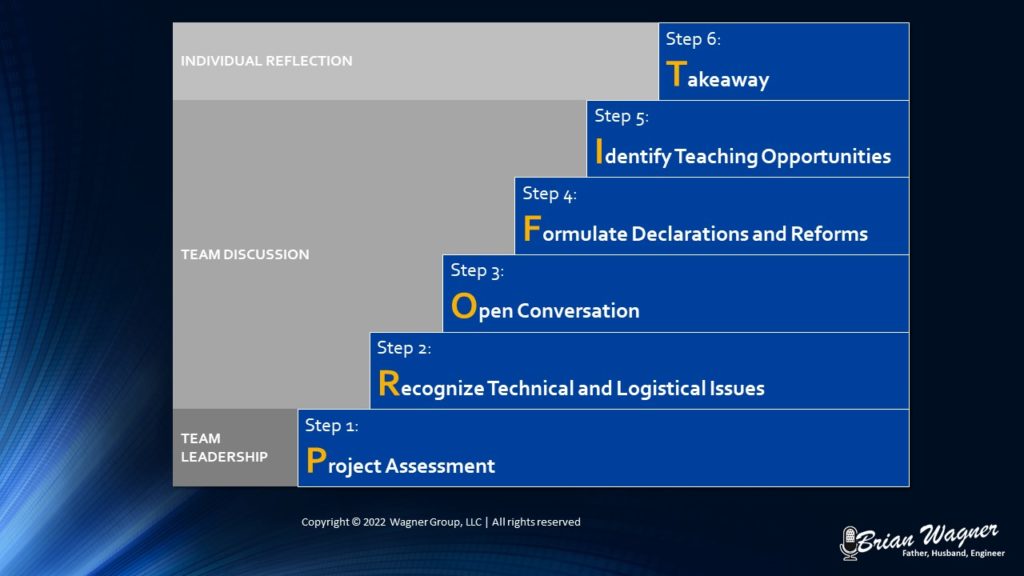6 steps of a Project Debriefing
The 6 steps of a Project Debrief are purposefully designed to help the team members share their experiences, challenges, and emotions. Through factual discussion and the sharing of different perspectives, the program is intended to identify and resolve issues while recognizing and acknowledging successes. A willingness to adapt and improve your systems is vital. A willingness to engage and empower your staff to improve opens doors of opportunity.
The primary focus of the debrief is to engage with your staff and empower them to have an interactive experience to help everyone improve, including your systems.
Brian E. Wagner, P.E.
Stage 1: Project Assessment
This initial stage involves the team’s core leadership staff. To effectively lead a debrief, you need to understand and gather information about the project to make it readily available for productive follow-up meetings. This practice is intended to identify the successes and where improvement can be made. It is also geared toward identifying remaining risks even after the project is complete. An effort to gather reference materials that can be provided during the debriefing is also helpful.
Stage 2: Recognize Technical and Logistical Issues
In this stage, team members are encouraged, but not forced, to open up and provide a brief, factual account of the process from their own point of view. This is a safe discussion and does not dive into details. The purpose of this step is to engage all team members in a conversation where their perspective is important to realize the potential for issues and where improvements can be made. The situation should be maintained in a positive light with personal control among participants.
Stage 3: Open Conversation
This stage begins by talking honestly about what participants think about the project. This is a go-around the table/room exercise, with each person getting a chance to share. It’s important to allow venting and validation to occur so participants can share their perspectives in a safe and supportive environment.
Questions to facilitate the conversation may include:
- “What could have made your role more efficient?” (This is not necessarily “easier” but focused on where process and communication improvements can be made.)
- “What was the worst/best thing about this project for you personally?”
- “If you could change one part of the design, what would you change?” (The design that was completed may not be wrong by any means but a challenge to find ways to improve.)
- “What aspects of the situation cause you the most frustration/stress?”
Stage 4: Formulate Declarations and Reforms
As participants reach this stage, it may or may not be obvious where improvements can be made in the future. Declarations focus on positive takeaways from the project. This can be specific to the work or project deliverables themselves or directed to individuals on the team. Reforms are focused on where improvement can be made. As the opposite of declarations, they could focus on negative takeaways but should be emphasized as ways to improve and not specific to the negative situation. For example, if site grading caused drainage issues, the focus should be on minimum expectations for site grading and not statements like, “Let’s not do that again.”
Stage 5: Identify Teaching Opportunities
At this point, the opportunities may be abundantly clear on how the team and team members can improve. Identifying teaching points does not need to be geared toward entry-level skills. It should consider how the team can escalate their abilities to improve future work, no matter their experience. Before closing out the debrief, schedule follow-up tasks. Don’t just talk about what you want to do better, take action to improve.
Stage 6: Takeaway
The goal is to have an honest conversation as a team and an individual, centered on finding opportunities to get better. This stage is focused on a personal review of the project, the individual’s roles and responsibilities, and the findings and points mentioned during the debriefing. Structured as self-reflection, individuals should ask themselves the question, “Knowing what I know now, what could I do better?”
I discuss this process in Episode 6 of the Engineering Quality Control Podcast:

A professional service role is more than a job. It is a profession – a career – a calling. Leave a lasting impact on the community and the world we live in. To be better, we must get better. Engage and empower your team to see it this way.
If this resonates with you, let’s continue the conversation! Connect with me on LinkedIn.


